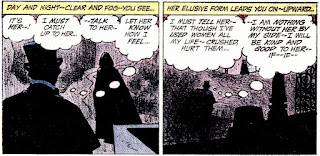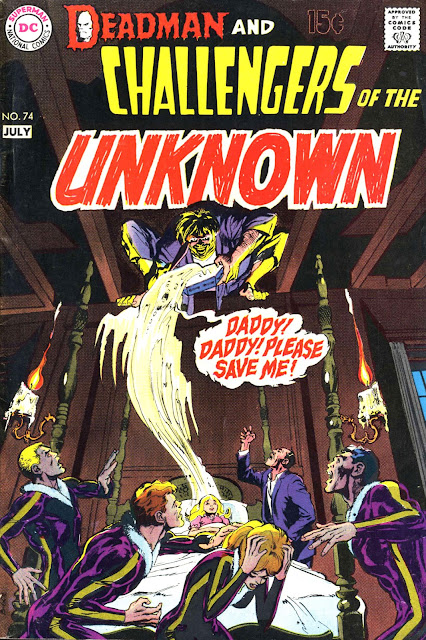THE WITCHING HOUR #10 September 1970
An old man in a wheelchair recoils in terror at the sight before him-- the tall French windows of the room he is in are wide open to reveal a woman. In true horror-movie style she appears in silhouette, backlighting rendering her dress transparent to reveal her bewitching hourglass figure.
The artist is of course Neal Adams, and the cover is from THE WITCHING HOUR #10, dated September 10, 1970. Easily one of the most startlingly effective cover-images that I have seen gracing Bronze Age Horror anthologies, it illustrates a subtle, quietly chilling tale by Gerry Conway entitled HOLD SOFTLY, HAND OF DEATH! It is another great example of stories being published at this time that deals with the theme of obsession. I have previously written about the stories DEATH HAS MARBLE LIPS! in HOUSE OF SECRETS #87 and MASK OF THE RED FOX in HOUSE OF MYSTERY #187 and observed how these narratives offer themes which are clearly aimed at a somewhat older reader than might be assumed to have been reading these titles in the early 70's.
As with the latter story mentioned above, HOLD SOFTLY, HAND OF DEATH! is illustrated masterfully by Alex Toth. Again he employs a distinctly European style radically different to the cartoonish style he adopts for the framing story elsewhere in THE WITCHING HOUR. The first page sees the 'camera' move from within the darkened confines of a French seaside old people's home out onto the verandah above the beach before swooping down to circle round and close in on a solitary old man sat in his wheelchair seemingly staring out at the crashing waves. The panels are uncrowded and rendered with a limited, muted palette, emphasising the emptiness of this man's existence. The scene is supremely tranquil and poignant. Apart from the hunched over figure of an elderly person in the first frame everything is still-- the only movement really is the sea ("symbol of life" the first caption informs us).
The single cutaway focuses on a pair of old women who inform us that this is the "cold and tragic" Pierre Lebas, "a man lost". Meanwhile the captions address Pierre directly, referring to his "bittersweet memories".
Finally we see that his eyes are in fact closed, the narrator commenting that although "so many years" have passed since his "prime", it is "only a page away in your life's book". This poetic phrase suggests not only that his memories of long ago are still uppermost in his thoughts, but also that his life has passed without significant incident since he was a young man. A lone seagull which seems to have escaped from one of Hugo Pratt's CORTO MALTESE adventures soars above Pierre, out of reach, unattainable.
The story now takes us back in time to when Pierre was a young man. Many of the frames from this point on are crowded with people, such as the compelling splash page that establishes the world of Pierre's past-- lavish, lively society balls and functions. Our narrator tells us that at this time Pierre was "cold", "a merciless, callous rogue" that here is a man who treated women "ruthlessly", "cruelly abusing" their attraction to him and "almost revelling" in their distress. As he dances with a young beauty, his cruelty is revealed as he insults her dancing. Watching him are two of THE WITCHING HOUR's hosts, Mordred and Mildred who comment that his eyes are "pure animal" and that he will end up "destined to know the cold kiss of Madame Guillotine".
What makes this story so special for me are the elements of ambiguity in the narrative. First of all we are given no clue as to why exactly Pierre behaves the way he does, only that his behaviour is pretty dreadful. His dance partner at the first party admits that although he is "a beast", "there is a certain something about you". He arrogantly acknowledges this, confidently claiming that "it's that something which allows me to choose among you ugly cows -- until I find one who amuses me...!" Don't be fooled by revisionists claiming that older comics were peopled solely with heroic protagonists and that modern comics do a disservice to young readers by focusing too much on flawed or villainous characters. There are few "heroes" in these Horror anthology titles, and Pierre Labas is an especially unpleasant example.
Wondering whether she herself amuses him, Pierre responds by calling this young woman "a chilling bore" and slapping her face. We see that not only is his attitude to women indefensible, but also curiously that he does eventually wish to find a more permanent partner. This seemingly contradictory revelation makes him a more three-dimensional character. It also gives an added irony to what will later happen to him.
In contrast to the sun-drenched sequences bookending the story, the narrative is now set almost entirely at night, Toth employing dark shadows in almost every frame now to partially obscure characters' faces and add to the sense that in a story like this we are never going to be shown the full picture. And there's the sea again, a motif which links the reader back to the first page, prompting us to note that we are about to learn what happened all these years ago to cause Pierre's downfall.
The next frames are almost completely black-- even the moon's light is shadowed, suggesting the darkness into which Pierre's life is about to be cast.
When the woman vanishes the angle switches to the cliff-top so that we look down on Pierre now, small in the frame, questioned whether what he just saw was real or a dream.
And we hear more about his cruel personality, which is not solely confined to women. There is an irony in this exchange, it is not long before Pierre's obsession will ruin him, similarly breaking him for life.
When the mysterious woman appears silhouetted in the doorframe again it is at a moment of almost complete supernatural darkness, this time the candles being blown out by the wind.
For the first time we see the woman properly. Of course she is no more and no less beautiful than the other women Pierre has encountered. Which makes his reaction to her, noticed by the other guests, all the more irrational.
Encountering her on the beach he was unable to reach her. Now however it is simply a matter of ascending the staircase. Toth focuses on the man's fixed, determined eyes as he is mesmerised by thoughts of this woman. The narrator fires question after question at him, for which there are no simple answers.
In a lovely detail, the witches Mildred and Mordred appear again, and for the second time mention "fate". Are they mere observers, or have they had a hand, I wonder, in this story's events?
Follow @top_notch_toshCatching up with the young woman, Pierre is not satisfied with her reaction to him, and although we do not see it, her words reveal that he is being physically aggressive with her. He is a man used to imposing his will on women without a care for their feelings.
His assertion that she has "bewitched" him, taken his soul, ironically, reminds us that immediately before seeing her for the first time on the cliff-top, the narrator had queried whether he even had a soul. Despite his claim, he remains controlling and aggressive, backing her onto the balcony and clearly filling her with dread. It's a moment which foreshadows what will happen later.
We are not told exactly who this woman is or why she has the effect on Pierre that she does. Clearly he has been 'bewitched' but there is no suggestion that the woman herself is responsible for this. His defence seems not very far from that of the predatory male who excuses his behaviour by blaming women for enticing him in the first place.
What is clear and unambiguous is that he does not deserve the love and kindness these young women offer him, deserving instead the fate that befalls him following his encounter with the mysterious young woman. The narrator confirms this--
And then an extra little sting is set up when the woman disappears from sight--
His wide, staring eyes are hauntingly rendered as the supernatural element to the story takes complete hold--
And now the narrator seems to revel in taunting him as the screw is turned--
Still he blames the woman for his obsession, the artist ensuring that there are always barriers preventing him reaching her-- crowds, bars, another woman clinging to him. But the biggest barrier seems to be Pierre himself, his unpleasant personality which has not altered in any way at all.
When he finally catches up with her, again it is at night and she is presented merely as a black shape--
Of course, the narrative has brought us neatly back to this significant location--
And now we see in him the same emotion he has engendered in so many others--
There is also a distinct ambiguity around the woman's subsequent death. Are we to think that he pushes her over the edge of the cliff? And if so does he do it intentionally or accidentally? Or does she fall to escape his advances? There is no simple answer to these questions, because the vagueness of the scene is clearly deliberate.
And are we to understand that she is she not even a real person but some kind of phantasm conjured up to bring about retribution for all the harm Pierre has done to others? Women especially. The fact that she seems to disappear from the other party-guests' minds suggests this may be the case.
Or is Pierre simply imagining her throughout, has he been "bewitched", possibly even by Mordred and Mildred? Or is the answer something else completely? When he is told that no such woman has turned up at the party he actually says, "I must be going mad!!"
Without the inclusion of Pierre's harshness and cruelty this would be a simple tale of unrequited love, a sort of comic book version of WB Yeats' poem THE SONG OF WANDERING AENGUS in which the eponymous hero falls in love with a fairy woman who disappears leaving him to spend his lifetime searching vainly for her. Unlike Aengus, Pierre seems to have brought his fate upon himself because of the the way he chooses to behave. As such, the story could also be said to be striking a cautionary note. The final page provides a satisfying coda to the story, presenting Pierre, like Aengus, "old with wandering"--
Before reaching the biggest, and most satisfying ambiguity of all, as once more the story descends into darkness--
Once more the narrator addresses Pierre directly, asking him where he has gone. In answer, the narrator ponders the possibility that the mysterious woman 'came back to you' then changes it to 'or for you', that maybe he has 'claimed a love that has no -- end!'
Are we to understand in that final statement that Pierre is ultimately redeemed? That a lifetime of loneliness and yearning have been punishment enough for him and that in death he finally finds the woman he loves?
Or is there a final twisted irony in that word 'love', that when the woman comes 'for' him it is not the sort of love one person might feel for another and be reciprocated, but more the sort of love someone might feel for a tasty meal they are about to enjoy? One that 'has no -- end'?


































Comments
Post a Comment